LEN RAWLE
THE PROFESSIONAL AMATEUR
& ORGANIST SUPREME
-oOo-
PAGE FOUR:
THEATRE ORGAN SOCIETIES
-oOo-
There are two long established clubs, The Theatre Organ Club (TOC) and The Cinema Organ Society (COS), open to Theatre Organ enthusiasts that organise concerts in cinemas and halls where the Theatre Organ remained installed. In addition, the clubs keep members informed with the latest organ and organist news.
 The Theatre Organ Club (TOC) logo appears with the permission of the Club
The Theatre Organ Club (TOC) logo appears with the permission of the Club
-oOo-
The TOC was founded in 1938 as The Robinson Cleaver Radio Club although, despite its name, was never restricted to just Mr. Cleaver’s music, but served in general to promote the Theatre Organ and its players. This eventually led to a change in its name to The Theatre Organ Club in 1956. Meanwhile the COS was founded in 1952 by Hubert Selby and Tony Moss.
 Robinson Cleaver (1906-1987)
Robinson Cleaver (1906-1987)
-oOo-
 This Letterhead from 1954 appears with the permission of The Theatre Organ Club (TOC)
This Letterhead from 1954 appears with the permission of The Theatre Organ Club (TOC)
The TOC consisted of a Northern and Southern Branch with Mr. Ralph Bartlett as Organiser and Secretary of the Southern Branch and Mr. Frank Hare in charge of the Northern Branch.
The COS was divided into several districts: for example, London, Midlands, North etc with each District Secretary having the responsibility for arranging meetings and concerts. The Secretary of the London District in the late 1950s was Doug Badham.
-oOo-
Many of the concerts organised by the clubs were held on a Sunday morning once a month or occasionally on Sunday afternoons with the proviso that they ended promptly since the many venues had to be made ready for the screening of films. Concerts were organised in such a way that club presentations did not clash.
At these concerts, a well-known organist was invited to play without payment for members. However, prior to this, enthusiastic young organists were selected from the many hopefuls in attendance and given the opportunity to play the instrument for fifteen-minute periods.
-oOo-
Len had joined both the TOC and the COS sometime in the mid-1950s prior to starting his National Service. Often accompanied by his parents, he remembers regularly attending the concerts that were held in the Greater London area. Len says that he came not only to see and hear the invited organist, but also always with the hope of being invited to play the Theatre Organ before his peers.
It was the TOC that first recognised Len’s potential as a theatre organist and arranged for him to meet Mr. Carder, the manager of the Granada Theatre Willesden with a view to allowing him a weekly practice session on its Theatre Organ.
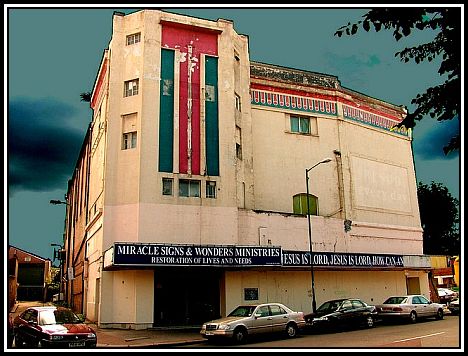 The Granada Theatre Willesden (as a church)
The Granada Theatre Willesden (as a church)
The renown organist, Bryan Rodwell (1925-1995; affectionately known as The Guv’nor) was present at the meeting in order to check Len out and to give the all clear for him to play following the Children’s Saturday Morning Matinee.
 Len seated at the console of the Theatre Organ of the Granada Theatre Willesden
Len seated at the console of the Theatre Organ of the Granada Theatre Willesden
-oOo-
Donald Thorne playing the Wurlitzerised and enlarged Christie Theatre Organ
(original 2 manuals; 7 ranks; enlarged 3-manuals; 9 ranks) of the Granada Theatre Willesden
-oOo-
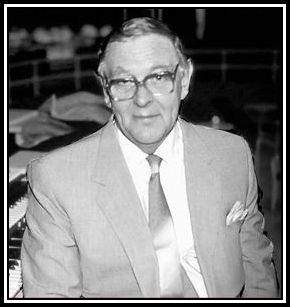
Bryan Rodwell playing Love Me or Leave Me
-oOo-
Len says that he has many happy memories of his practice time that he was fortunate to have at the theatre organ of the Granada Theatre Willesden. When he began traveling to Willesden, he was a newly qualified driver having only just passed his test.

Len’s father had recently purchased a brand spanking new car, a Ford Consul, and was very proud of it. Len says that his father generously allowed him to drive the car to his practice sessions. At first, his mother would accompany him and sit-in on several of the practice sessions. He recalls that she risked life & limb on these journeys thanks to the state of his driving at that time! However, fortunately, they did not have an accident and he managed to get his mother home safely!
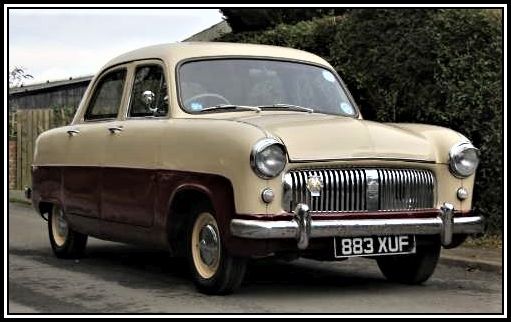 A 1953 Ford Consul
A 1953 Ford Consul
-oOo-
Len remembers that the organ had undergone changes since its installation and had been enlarged from a 7-rank to a 9-rank instrument. He says that the organ could be very forceful, and, as he says, playing it proved to be a baptism of fire for one so young!
-oOo-
Regarding Len’s memories of Brian Rodwell, one special memory stands out amongst the many. Len recalls that this very proud moment took place some years following their first meeting at the Granada Theatre Willesden in 1953. He and Mr. Rodwell had been invited to perform at the opening concert following the meticulous restoration of the Wurlitzer Theatre Organ installed at the St Albans Organ Museum on 25th July, 1992.
Len says that …… one of my all-time most satisfying memories was playing a 15-minute duet session with Brian on piano and me at the Wurlitzer to finish the programme. Len added that ……. I often meet people who were present at the concert and who remind me of that very electric performance, for the sheer brilliance of Brian at being able to pick up on anything I did at the organ and embellish it. It was like a dream come true. He was one of our great musicians and is missed very much.
-oOo-
Early in 1958, Len was invited to play at the TOC meeting held at the ABC Cinema Aldershot. His performance at the cinema’s Wurlitzer Theatre Organ was well received by Club members, As of result of Club members hearing his performance at the cinema’s Wurlitzer Theatre Organ, and as a result Mr. Ralph Bartlett, the Club Organiser, asked if he would like to play the Compton Theatre Organ of the Essoldo (formerly the Ritz) Cinema Tunbridge Wells at the Club meeting to be held in September 1958. Naturally, Len jumped at the opportunity since it would give him his first opportunity to play a Compton Theatre Organ and experience the Compton Sound. Len says that since Compton Consoles were built to the standards of the Royal College of Organists (RCO), while Wurlitzer Consoles were built to American Guild of Organists (AGO) dimensions, they had a very different feel.
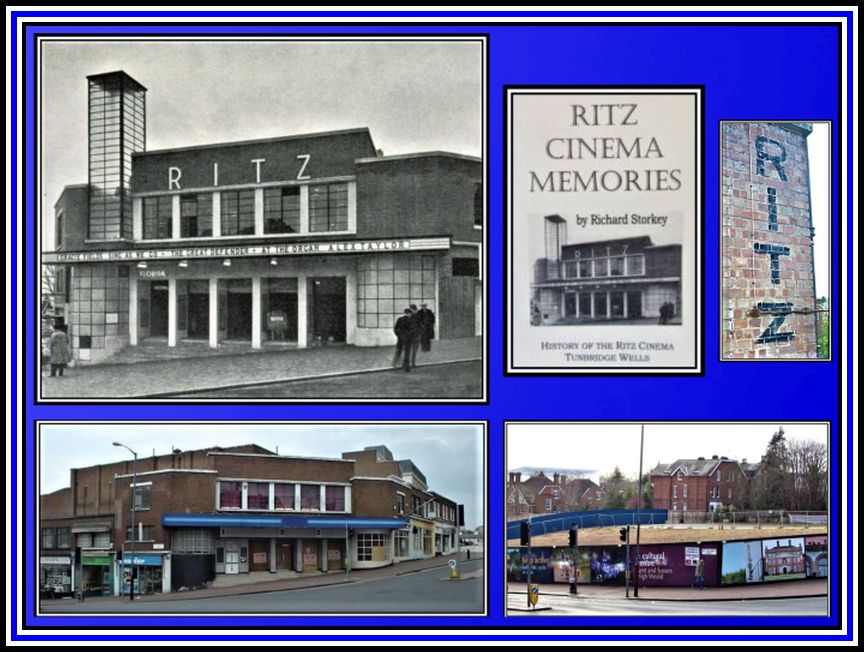 The Ritz Cinema Tunbridge Wells
The Ritz Cinema Tunbridge Wells
Top Left: the Cinema soon after its opening in 1934
Top Middle: Ritz Cinema Memories by Richard Storkey;
Top Right: sign once present on the rear wall of the Cinema
Bottom Left: the Cinema soon after closure in 2000
Bottom Right: following demolition in 2014
-oOo-
The meeting was held on the morning of Sunday, 14th September 1958. In addition to Len, two other young theatre organists, Keith Beckingham and Graham Wright, were invited to play the cinema’s Compton Theatre Organ (3 manual 6 ranks) at this meeting.
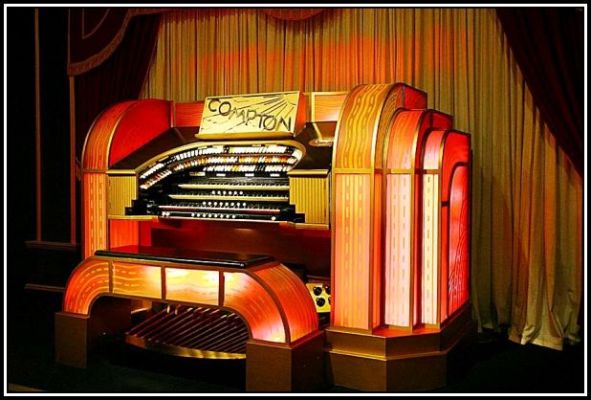 The Compton Theatre Organ (3 manual 6 ranks) with Illuminated Console
The Compton Theatre Organ (3 manual 6 ranks) with Illuminated Console
once present at The Ritz Cinema Tunbridge Wells
The photograph appears by permission of The Burtey Fen Collection
-oOo-
In November 1958, the magazine, Musical Opinion, reported on this meeting of the Theatre Organ Club (TOC), and reviewed the day’s events. The article mentioned that amongst the players, the younger generation was represented by Len Rawle, Keith Beckingham and Graeme Wright. This report is significant in that it documents the first time that these future virtuosos appeared on the same bill.
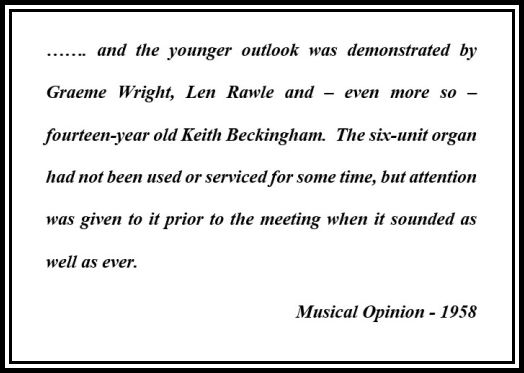
And with this, the three young organists, having been dubbed The Three Musketeers, took centre stage and began making their presence felt and heard ……. En garde!
-oOo-
Len recalls his experience of playing the Compton Theatre Organ of The Ritz Cinema Tunbridge Wells in September 1958 very well, which was just prior to the end of his National Service.
Len has maintained membership to both the TOC and COS, but has never become an Officer of either society. However he has been voted Patron (of one year duration) of the TOC on three occasions including this current year (2020).
-oOo-
Len’s parents were also members of both the TOC and the COS and attended meetings regularly. Following the transplanting of the erstwhile Wurlitzer Theatre Organ of the Granada Theatre Wandsworth and visits from Richard Simonton, the American founder of American Theatre Organ Society (ATOS), Len and his parents formed the UK Chapter of the ATOS.
To read more of the founding of the Chapter,
please go to PAGE SEVEN
——oooOOOooo——
-oOo-
——oooOOOooo——
